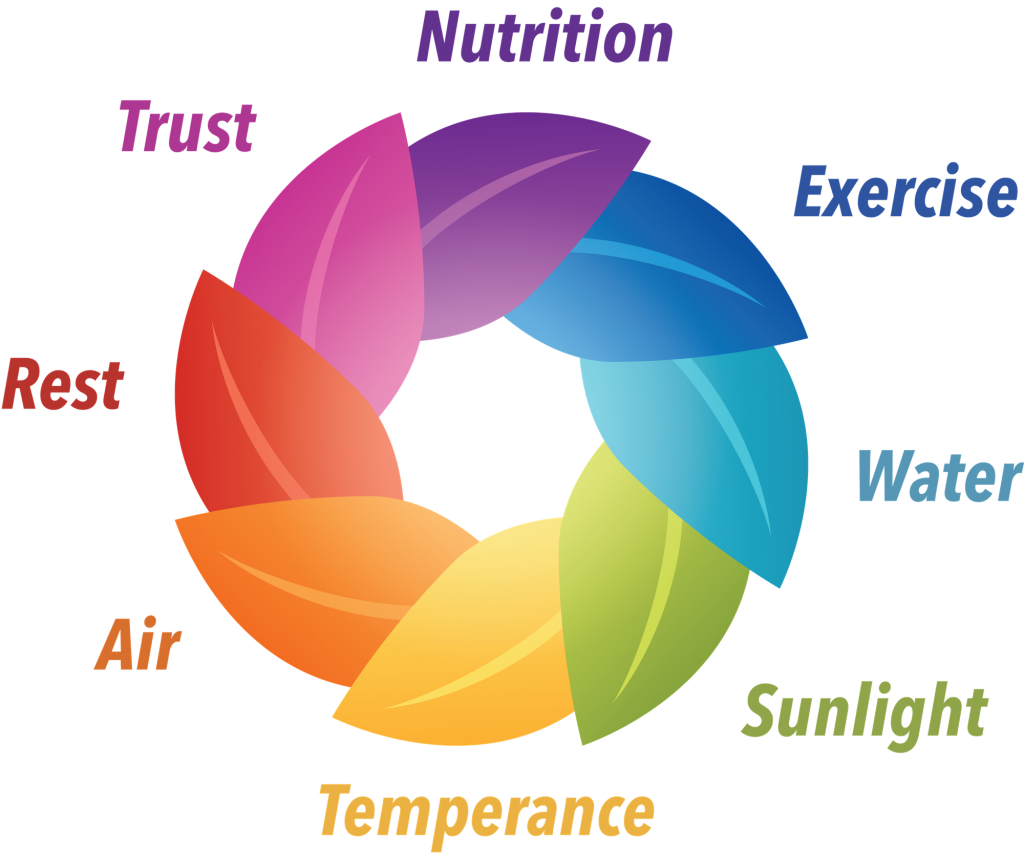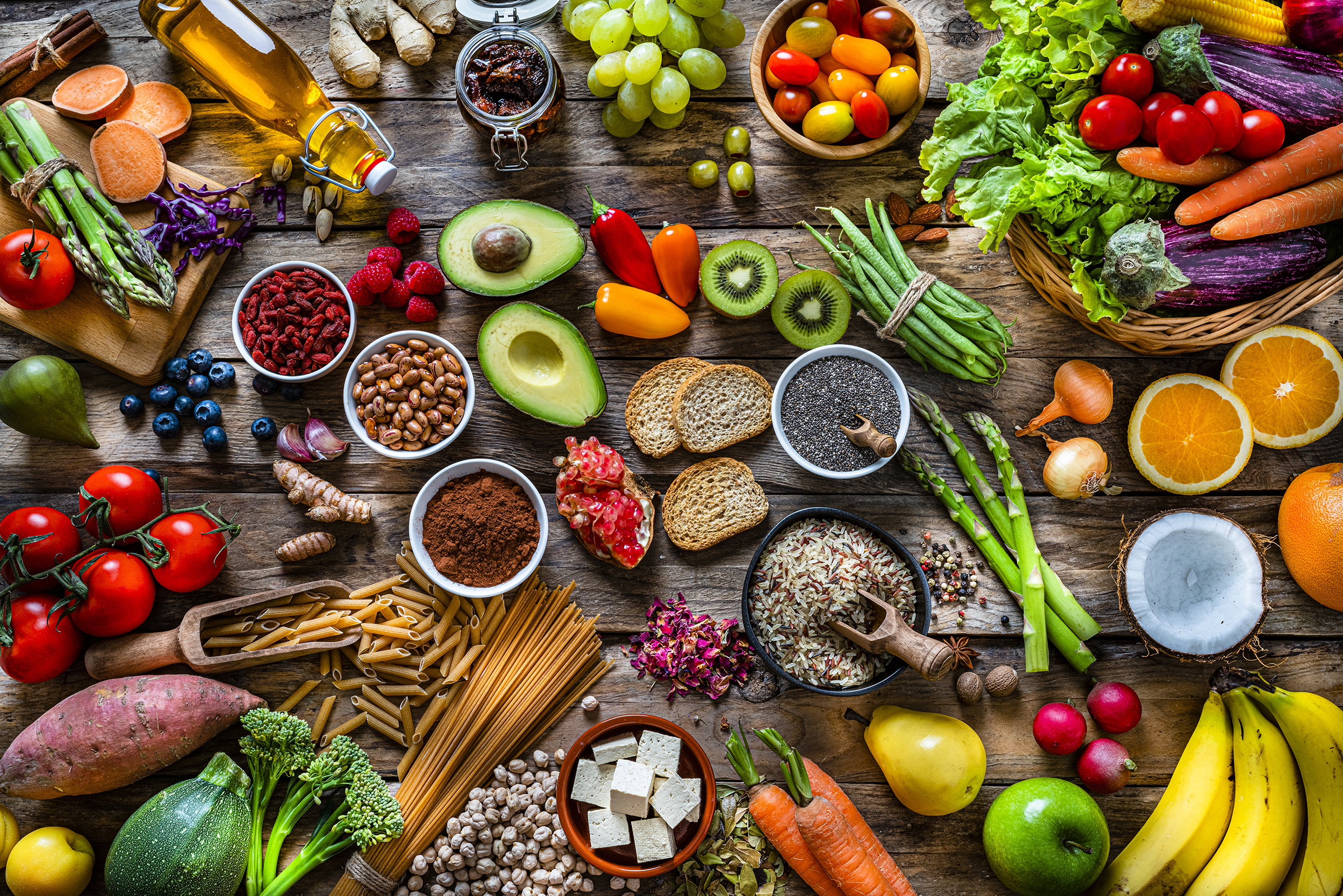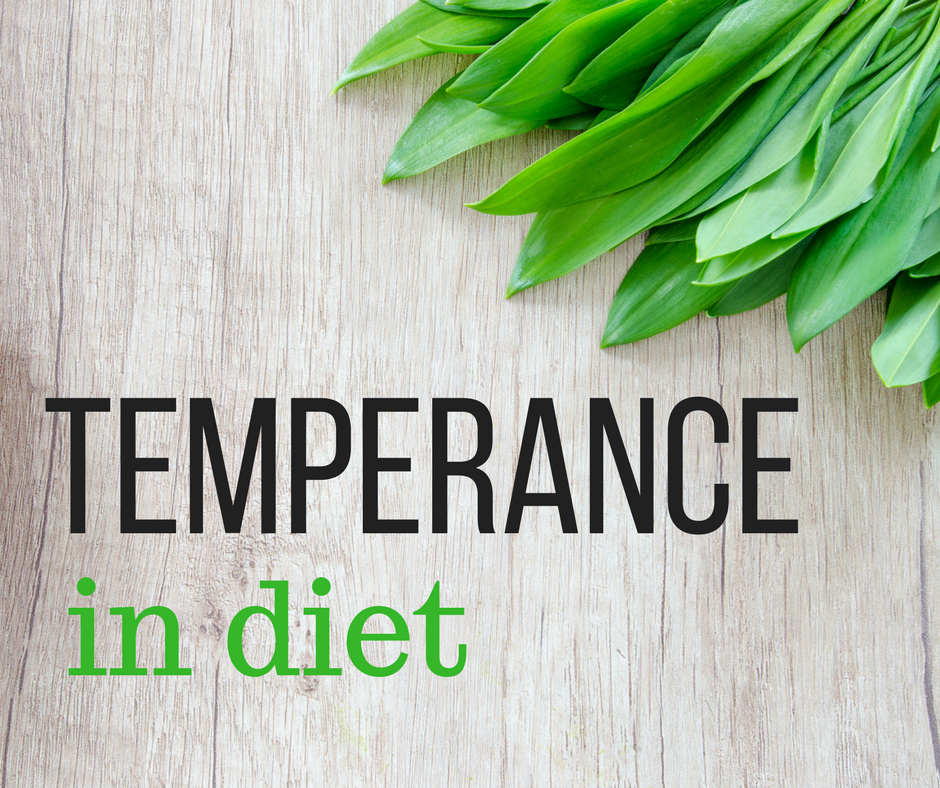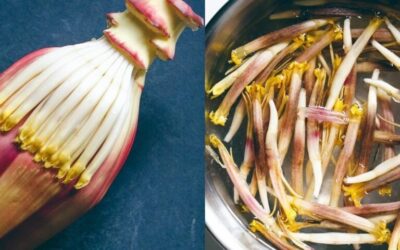
Nutrition & The Bodily Temple – (Return To Eight Laws Table At Top)
The earthly tabernacle, its priesthood and the sacrificial ceremonies were types and shadows pointing to the true tabernacle in heaven and to our Sin-Bearer and Great High Priest – Jesus Christ. The Son of God said, “Destroy this temple, and in three days I will raise it up…But he spake of the temple of his body.” (John 2:19, 21). The apostle Paul teaches us that our body “…is the temple of the Holy Ghost which is in you, which ye have of God, and ye are not your own?” “For ye are bought with a price: therefore glorify God in your body, and in your spirit, which are God’s.” (1 Corinthians 6:19, 20).
” Whether therefore ye eat, or drink, or whatsoever ye do, do all to the glory of God.” (1 Corinthians 10:31).
Can we live according to God’s Holy Law by disregarding the items of food and drink that we place in our bodily temples? By the inspiration of the Spirit of God, Paul the apostle writes that “whatsoever ye do”, even the natural act of eating and drinking, should be done, not to gratify a perverted appetite, but under a sense of responsibility, – “do all to the glory of God.” Every part of the man is to be guarded; we are to beware lest that which is taken into the stomach shall banish from the mind high and holy thoughts. Our very bodies are not our own, to treat as we please, to cripple by habits that lead to decay, making it impossible to render to God perfect service. The words “Ye are not your own, ye are bought with a price” should be hung in memory’s hall, that we may ever recognise God’s rights to our talents, our property, our influence, our individual selves. We are to learn how to treat this gift of God, in mind, in soul, in body, that as Christ’s purchased possession, we may do him healthful, savoury service.
God’s Original Diet To Man
God, who created man and understands our needs, gave us a diet that best supplies the elements needed for the building of the body.
“Behold I have given you every herb bearing seed, which is upon the face of all the earth, and every tree, in the which is the fruit of a tree yielding seed; to you it shall be for meat.” (Genesis 1:29). The word “meat” originates from the hebrew, oklah, which means food.
The following explanation of the above scripture is given according to foods as we know them today:-
|
” Behold I have given you every herb bearing seed…”
|
| Grains – wheat, corn, rye, barley, rice, millet, oats, buckwheat etc |
| Seeds – sunflower, sesame, flax, pumpkin seeds etc. |
| Legumes – soybeans, lentils, peas, peanuts, other beans etc. |
| Succulent Foods Containing Seed – eggplant, okra, bell pepper, green beans, pumpkins, cucumbers, tomatoes, melons etc. |
|
“…and every tree, in the which is the fruit of a tree yielding seed…” (Genesis 1:29)
|
| Fruits – citrus fruits (oranges, lemons) |
| Sub-acid fruits (apples, peaches) |
| Sweet fruits (dates, raisins) |
| Palm fruits (bananas, pineapple) |
| Neutral fruits (avocados, olives) |
| Nuts – almonds, pecans, cashews, brazil, walnuts, chestnuts etc. |
After man sinned, he was driven out of the Garden of Eden, and no longer had access to the wonderful tree of life. Man had to gain his livelihood by tilling the earth, and the “herb of the field”, which was originally food for the animals (Genesis 1:30), was added to his diet.
“And unto Adam He said, Because thou hast hearkened unto the voice of thy wife…cursed is the ground for thy sake… and thou shalt eat the herb of the field.” (Genesis 3:17, 18).
Although vegetables (the green herb of the field) were not part of the Original Diet given to man, they were added to man’s diet after he had sinned and are a part of his diet today.
Health Reform And The Three Angels Messages
The impact of God’s final message to the world presented in Revelation 14:6-12 will result in a group of believers who will heed the call of warning, and by the faith of Jesus, will be living in harmony with all of God’s revealed will.
Health is a major determining factor in the capacity to understand and respond to the everlasting gospel in the Three Angels Messages. Thus physical health is involved in fearing God and giving Him glory.
“Fear God, and give glory to Him…” (Revelation 14:7).
Before focusing on the components of health reform and its significance to the Three Angels Messages, we may observe practical illustrations of health and temperance within the Scriptures. We may study a few of these examples.
The Manna From Heaven And The Fleshpots Of Egypt (Exodus 15:26; Exodus chapter 16 & Numbers chapter 11).
In choosing man’s food in Eden, the Lord showed what was the best diet; in the choice made for Israel He taught the same lesson. He brought the Israelites out of Egypt and undertook their training, that they might be a people for His own possession. Through them he desired to bless and teach the world. He provided them with the food best adapted for this purpose, not flesh, but manna, “the bread of heaven”. It was only because of their discontent and their murmuring for the fleshpots of Egypt that animal food was granted them, and this only for a short time. Its use brought disease and death to thousands. Yet the restrictions to a non-flesh diet was never heartily excepted. It continued to be the cause of discontent and murmuring, open or secret, and it was not made permanent.
Upon their settlement in Canaan, the Israelites were permitted the use of animal food, but under careful restrictions which tended to lesson the evil results. The use of swine’s flesh was prohibited, as also of other animals and of birds and fish whose flesh was pronounced unclean. Of the meats permitted, the eating of the fat and the blood was strictly forbidden. (Leviticus 3:17; 17:11-14).
By departing from the plan divinely appointed for their diet, the Israelites suffered great loss. They desired a flesh diet, and they reaped its results. They did not reach God’s ideal of character or fulfill His purpose. The Lord “gave them their request; but sent leanness into their soul.” (Psalm 106:15). They valued the earthly above the spiritual, and the sacred pre-eminence which was His purpose for them they did not attain.
The history of the wilderness life of Israel was chronicled for the benefit of the Israel of God to the close of time. Their exposure to hunger, thirst and weariness, and in the striking manifestations of His power for their relief, is fraught with warning and instruction for His people in all ages.
Every week during their long sojourn in the wilderness the Israelites witnessed a threefold miracle, designed to impress their minds with the sacredness of the Sabbath: a double quantity of manna fell on the sixth day, none on the seventh, and the portion needed for the Sabbath was preserved sweet and pure, when if any were kept over at any other time it would become unfit for use.
The manna, falling from heaven for the sustenance of Israel, was a type of Him who came from God to give life to the world.
“I am that bread of life. Your fathers did eat manna in the wilderness, and are dead. This is the bread which cometh down from heaven, that a man may eat thereof, and not die. I am the living bread which came down from heaven…” (John 6:48-51).
Daniel Purposed In His Heart That He Would Not Defile Himself With The Portion Of The King’s Meat, Nor With The Wine Which He Drank (Daniel 1:5-16)
When Daniel was in Babylon, he was beset with temptations of which we have never dreamed, and he realised that he must keep his body under. He purposed in his heart that he would not drink of the king’s wine or of his dainties. He knew that in order to come off a victor, he must have clear mental perceptions, that he might discern between right and wrong. Four of the Hebrew captives decided that as flesh meat had not composed their diet in the past, it would not come into their diet in the future, and as wine had been prohibited to all who should engage in the service of God, they determined that they would not partake of it. The fate of the sons of Aaron had been presented before them:-
“And Nadab and Abihu, the sons of Aaron, took either of them his censer, and put fire therein, and put incense thereon, and offered strange fire before the Lord, which he commanded them not. And there went out fire from the Lord, and devoured them, and they died before the Lord…And the Lord spake unto Aaron, saying, Do not drink wine nor strong drink, thou, nor thy sons with thee, when ye go into the tabernacle of the congregation, lest ye die: it shall be a statute for ever throughout your generations: And that ye may put the difference between holy and unholy, and between unclean and clean.” (Leviticus 10:1, 2, 8-10).
The four young Hebrew captives knew that the use of wine would confuse their senses, and that the indulgence of appetite would becloud their powers of discernment. They knew not that their decision would cost them their lives; but they determined to keep the straight path of strict temperance even when in the courts of licentious Babylon. Daniel knew that by the time he was called to appear before the king, the advantage of healthful living would be apparent. He knew that ten days would be time enough to prove the benefit of abstemiousness.
In personal appearance the Hebrew youth showed a marked superiority over their companions. As a result, Daniel and his associates were permitted to continue their simple diet during their entire course of training. The Lord regarded with approval the firmness and self-denial of the Hebrew youth, and their purity of motive; and His blessing attended them:-
“As for these four children, God gave them knowledge and skill in all learning and wisdom: and Daniel had understanding in all visions and dreams.” (Daniel 1:17).
God Himself was their teacher. Constantly praying, conscientiously studying, keeping in touch with the Unseen, they walked with God as did Enoch. The same mighty truths that were revealed through these men, God desires to reveal through the youth and children today. The life of Daniel and his fellows is a demonstration of what He will do for those who yield themselves to Him and with the whole heart seek to accomplish His purpose.
Man Shall Not Eat By Bread Alone, But By Every Word Of God
“Then was Jesus led up of the Spirit into the wilderness to be tempted of the devil. And when He had fasted forty days and forty nights, he was afterward an hungred. And when the tempter came to him, he said, If thou be the Son of God, command that these stones be made bread. But He answered and said, It is written, Man shall not live by bread alone, but by every word that proceedeth out of the mouth of God.” (Matthew 4:1-4).
Christ is our example in all things. As we see His humiliation in the long trial and fast in the wilderness to overcome the temptations of appetite in our behalf, we are to take this lesson home to ourselves when we are tempted. If the power of appetite is so strong upon the human family, and its indulgence so fearful that the Son of God subjected Himself to such a test, how important that we feel the necessity of having appetite under the control of reason. Our Saviour fasted nearly six weeks, that he might gain for man the victory on the point of appetite. It is a painful fact that habits of self-gratification at the expense of health, and the weakening of moral power, are holding in the bonds of slavery at the present time a large share of the Christian world. Christ knew that appetite would be man’s idol, and would lead him to forget God, and would stand directly in the way of his salvation.
A “N.E.W. S.T.A.R.T.” Through Healthful Living:-
Nutrition
Exercise
Water
Sunlight
Temperance
Air
Rest
Trust In Divine Power
Sin, the transgression of divine law, is the primary cause of disease, sickness and death. Obedience to moral law can be rendered only through the acceptance and union with Christ, the Redeemer of man ruined through transgression.
God wants us to first prevent disease by healthful living. If we do become ill, He wants us to do for ourselves what we can through simple, natural remedies. If we need professional assistance, the health professional is to improve the use of the eight natural remedies as described above. However, if improvement is not made, it is not a denial of faith in God’s miracle-working power to utilise methods of diagnosis and treatment to save life and prevent disability if they are based upon a knowledge, and obedience to God’s Natural Laws.
Therefore, our first duty, one to which we owe to God, to ourselves and to our fellow men is to obey the laws of God which include the laws of health.
Our bodies are built up from the food we eat. It is a wonderful process that transforms the food into blood, and uses this blood to build up the varied parts of the body; but this process is going on continually, supplying with life and strength each nerve, muscle, and tissue. Those foods should be chosen that best supply the elements needed for building up the body. We can not safely be guided by the customs of society. The disease and suffering that everywhere prevail are largely due to unpopular errors in regard to diet.
Grains, fruits, nuts, and vegetables constitute the diet chosen for us by our Creator. These foods, prepared in as simple and natural manner as possible, are the most healthful and nourishing. They impart a strength, a power of endurance, and a vigour of intellect, that are not afforded by a more complex and stimulating diet.
Care should be taken in the selection of food. Our diet should be suited to the season, to the climate in which we live, and to the occupation that we follow. For example, food that can be used with benefit by those engaged in hard physical labour is unsuitable for persons of sedentary pursuits or intense mental application. God has given us an ample variety of healthful foods, and each person should choose from it the things that experience and sound judgment prove to be best suited to his own necessities.
Nuts and nut foods are coming largely in to use to take the place of flesh meats. With nuts may be combined grains, fruits and some root vegetables, to make foods that are healthful and nourishing. Care should be taken, however, not to use too large a proportion of nuts.
When properly prepared, olives, like nuts, supply the place of butter and flesh meats. The oil, as eaten in the olive, is far preferable to animal oil or fat. It serves as a laxative. Its use will be found beneficial to consumptives, and it is healing to an inflamed, irritated stomach.
Variety
There should not be a great variety at any one meal, for this encourages overeating, and causes indigestion.
It is not well to eat fruit and vegetables at the same meal. If the digestion is feeble, the use of both will often cause distress, and inability to put forth mental effort. It is better to have the fruit at one meal, and the vegetables at another.
The meals should be varied. The same dishes, prepared in the same way, should not appear on the table meal after meal and day after day. The meals are eaten with greater relish, and the system is better nourished, when food is varied.
Preparation Of Food
It is wrong to eat merely to gratify the appetite, but no indifference should be manifested regarding the quality of the food, or the manner of its preparation. In the preparing of bread, the following points may prove useful:-
Fine-flour bread is lacking in nutritive elements to be found in bread made from the whole wheat. It is a frequent cause of constipation and other unhealthful conditions.
The use of soda or baking-powder in bread making is harmful and unnecessary. Soda causes inflammation of the stomach, and often poisons the entire system.
In the making of raised or yeast bread, milk should not be used in place of water. Milk bread does not keep sweet so long after baking as does that made with water, and it ferments more readily in the stomach.
The loaves should be small, and so thoroughly baked that, so far as possible, the yeast germs shall be destroyed. When hot or new, raised bread of any kind is difficult of digestion. It should never appear on the table. Bread which is two or three days old is more healthful than new bread. This rule does not, however, apply to unleavened bread.
Zwieback, or twiced-baked bread, is one of the most easily digested and most palatable of foods.
Far too much sugar is ordinarily used in food. Cakes, sweets puddings, pastries, jellies, jams, are active causes of indigestion. Especially harmful are the custards and puddings in which milk, eggs, and sugar are chief ingredients. The free use of milk and sugar taken should be avoided.
Cheese may be regarded as wholly unfit for food. The objectionable features of hard or ripened cheeses are that the putrefactive process which cheese undergoes, result in the production of waste products (amines, ammonia and irritating fatty acids), which cause irritation to the nerves and the gastrointestinal tract; one of the toxic amines produced in cheese called tyramine, can cause migraine headaches and the rennet used in cheese making, comes from the stomach of calves, lambs or pigs.
Regularity In Eating
Regularity in eating is of vital importance. There should be a specified time for each meal. At this time, let every one eat what the system requires, and then take nothing more until the next meal. There are many who eat when the system needs no food, at irregular intervals, and between meals, because they have not sufficient strength of will to resist inclination. When travelling, some are constantly nibbling if anything eatable is in their reach. This is very injurious. If travellers would eat regularly of food that is simple and nutritious, they would not feel so great weariness, nor suffer so much from sickness.
Another pernicious habit is that of eating just before bedtime. The regular meals may have been taken; but because there is a sense of faintness, more food is eaten. As a result of eating late suppers, the digestive process is continued through the sleeping hours. But though the stomach works constantly, its work is not properly accomplished. The sleep is often disturbed with unpleasant dreams, and in the morning the person awakes unrefreshed, and with little relish for breakfast.
In many cases the faintness that leads to a desire for food is felt because the digestive organs have been too severely taxed during the day. After disposing of one meal, the digestive organs needs rest. At least five or six hours should intervene between the meals; and most persons who give the plan a trial, will find that two meals a day are better than three.
Wrong Conditions Of Eating
Food should not be eaten very hot or very cold. If food is cold, the vital force of the stomach is drawn upon in order to warm it before digestion can take place. Cold drinks are injurious for the same reason; while the free use of hot drinks are debilitating. In fact, the more liquid there is taken with the meals, the more difficult for the food to digest; for the liquid must be absorbed before digestion can begin. Do not eat largely of salt, avoid the use of pickles and spiced foods, eat an abundance of fruit, and the irritation that calls for so much drink at meal time will largely disappear. Food should be eaten slowly, and should be thoroughly masticated. This is necessary, in order that the saliva may be properly mixed with the food and the digestive fluids be called into action.
Another serious evil is eating at improper times, as after violent or excessive exercise, when one is much exhausted or heated. Digestion is hindered. When one is excited, anxious, or hurried, it is better not to eat until rest or relief is found.
At meal time cast off care and anxious thought; do not feel hurried, but eat slowly and with cheerfulness, with your heart filled with gratitude to God for all His blessings.
Overeating
Many who discard flesh-meats and other gross and injurious articles think that because their food is simple and wholesome they may indulge their appetite without restraint, and they eat to excess, sometimes to gluttony.
“For they are such serve not our Lord Jesus Christ, but their own belly; and by good words and fair speeches deceive the hearts of the simple.” (Romans 16:18).
Sometimes the result of overeating is felt at once. In other cases there is no sensation of pain; but the digestive organs lose their vital force, and the foundation of physical strength is undermined.
“(For many walk, of whom I have told you often, and now tell you even weeping, that they are the enemies of the cross of Christ: Whose end is destruction, whose god is their belly, and whose glory is in their shame , who mind earthly things.)” (Philippians 3:18, 19).
The surplus food burdens the system, and produces morbid, feverish conditions. It calls an undue amount of blood to the stomach, causing the limbs and the extremities to chill quickly. It lays a heavy tax on the digestive organs, and when these organs have accomplished their task, their is a feeling of faintness or languor. Some who are continually overeating call this all-gone feeling hunger; but it is caused by the overworked condition of the digestive organs. At times there is a numbness of the brain, with disinclination to mental or physical effort.
Diet On The Sabbath (Exodus chapter 16 & 20:8-11)
We should not provide for the Sabbath a more liberal supply or a greater variety of food than for other days. Instead of this, the food should be more simple, and less should be eaten, in order that the mind may be clear and vigorous to comprehend spiritual things. A clogged stomach means a clogged brain.
Cooking on the Sabbath should be avoided; but it is not therefore necessary to eat cold food. In cold weather the food prepared the day before should be heated. And let the meals, however simple, be palatable and attractive.
Reform In Diet
Every day men in positions of trust have decisions to make upon which depend results of great importance. Often they have to think rapidly, and this can be done successfully by those only who practice strict temperance. A disordered stomach produces a disordered, uncertain state of mind. Often it causes irritability, harshness, or injustice. Many a plan that would have been a blessing to the world has been set aside, many unjust, oppressive, even cruel measures have been carried, as the result of diseased conditions due to wrong habits of eating.
Here is a suggestion for all whose work is sedentary or chiefly mental; let those who have sufficient moral courage and self-control try it: At each meal take only two or three kinds of simple food, and eat no more than is required to satisfy hunger. Take active exercise every day, and see if you do not receive benefit.
Strong men who are engaged in active physical labour are not compelled to be as careful as to the quantity or quality of their food as are persons of sedentary habits; but even these would have better health if they would practice self-control in eating and drinking.
One person can not lay down an exact rule for another. Every one should exercise reason and self-control and should act from principle.
Persons who have indulged their appetite to eat freely of meat, highly seasoned gravies, and various kinds of rich cakes and preserves, cannot immediately relish a plain, wholesome, nutritious diet. Their taste is so perverted they have no appetite for a wholesome diet of fruits, plain bread and vegetables. If they cannot at first enjoy plain food, they should fast until they can. That fast will prove to them of greater benefit than medicine, for the abused stomach will find rest which it has long needed, and real hunger can be satisfied with a plain diet. It will take time for the taste to recover from the abuse it has received, and to gain its natural tone. But perseverance in a self-denying course of eating and drinking will soon make plain, wholesome food palatable, and it will be eaten with greater satisfaction than the epicure enjoys over his rich dainties.
Our bodies are Christ’s purchased possession, and we are not at liberty to do with them as we please. Therefore the question with us is not, “What is the world’s practise?” but, “How shall I as an individual treat the habitation that God has given me?”
Exercise – (Return To Eight Laws Table At Top)Man’s employment, as seen in the original design is also worthy of notice. “And the Lord God took the man, and put him in the garden of Eden to dress it and to keep it.” (Genesis 2:15). Man was designed for activity in the open light of the sun and the free air of heaven. These conditions were important to the joys of his existence. The subsequent curse upon Adam was not in that he should labour, but that his labours should be attended with difficulties. Exercise is essential for the body. Morning exercise, in walking in the free, invigorating air of heaven, or cultivating flowers, small fruits, and vegetables, is necessary to a healthful circulation of the blood. It is the surest safeguards against colds, coughs, congestion of the brain and lungs, inflammation of the liver, the kidneys, and the lungs, and a hundred other diseases.
Exercise aids the digestion. When we engage in severe study or violent physical exercise immediately after eating, it hinders the work of digestion; but a short walk after a meal, with the head erect and the shoulders back, is a great benefit.
Water – (Return To Eight Laws Table At Top)In health and in sickness, pure water is one of heaven’s choicest blessings. Its proper use promotes health. It is the beverage which God provided to quench the thirst of animals and man. Drunk freely, it helps to supply the necessities of the system, and assists nature to resist disease. The external application of water is one of the easiest and most satisfactory ways of regulating the circulation of the blood. A cold or a cool bath is an excellent tonic. Warm baths opens the pores, and thus aid in the elimination of impurities. Both warm and neutral baths soothe the nerves and equalise the circulation.
Whether a person is sick or well, respiration is more free and easy if bathing is practiced. By it, the muscles become more flexible, the mind and body are alike invigorated, the intellect is made brighter, and every faculty becomes livelier. The bath is a soother of the nerves. It promotes general perspiration, quickens the circulation, overcomes obstructions in the system, and acts beneficially on the kidneys and urinary organs. Bathing helps the bowels, stomach, and liver, giving energy and new life to each. It also promotes digestion, and instead of the system being weakened, it is strengthened. Instead of increasing the ability to cold, a bath, properly taken, fortifies against cold, because the circulation is improved.
As an additional aid, you may find by fasting for one or two meals, and by drinking only pure, soft water, the overburdened system will be enabled to overcome slight indispositions, and even graver difficulties may be sometimes overcome by this simple process.
Sunlight – (Return To Eight Laws Table At Top)
Human beings, like plants, need adequate sunlight. If the windows were freed from blinds and heavy curtains, and the air and sun permitted to enter the darkened rooms, there would be seen a change for the better in the mental and physical health. The pure air would have an invigorating influence, and the sun that carries healing in its beams would soothe and cheer, and make one happy, joyous and healthy.
Trees and shrubbery too close around a house are unhealthful; for they prevent a free circulation of air, and prevent the sun rays from shining through sufficiently. In consequence of this a dampness gathers in the house, which may cause rheumatism, neuralgia and lung complaints.
Temperance – (Return To Eight Laws Table At Top)True temperance teaches us to dispense with everything hurtful and to use judiciously that which is healthful.
Those who understand the laws of health and who are governed by principle, will shun the extremes, both of a self-indulgent appetite or of an insufficient meager diet. Their diet is chosen, not for the mere gratification of appetite, but for the upbuilding of the body. They seek to preserve every power in the best condition for highest service to God and man. The appetite is under the control of reason and conscience, and they are rewarded with health of body and mind. While they do not urge their views offensively upon others, their example is a testimony in favour of right principles.
Condiments
In this fast age, the less exciting the food, the better. Condiments are injurious in their nature. Mustard, pepper, spices, pickles, and other things of a like character, irritate the stomach and make the blood feverish and impure. The inflamed condition of the drunkard’s stomach is often pictured as illustrating the effect of alcoholic liquors. A similarly inflamed condition is produced by the use of irritating condiments. Soon ordinary food does not satisfy the appetite. The system feels a want, a craving, for something more stimulating.
Tea and Coffee
Tea acts as a stimulant, and, to a certain extent, produces intoxication. The action of coffee and many other popular drinks is similar. The first effect is exhilarating. The nerves of the stomach are excited; these convey irritation to the brain, and this in turn is aroused to impart increased action to the heart, and short-lived energy to the entire system. Fatigue is forgotten; the strength seems to be increased. The intellect is aroused, the imagination becomes more vivid.
Because of these results, many suppose that their tea or coffee is doing them great good. But this is a mistake. Tea and coffee do not nourish the system. Their effect is produced before there has been time for digestion and assimilation, and what seems to be strength is only nervous excitement. When the influence of the stimulant is gone, the unnatural force abates, and the result is a corresponding degree of languor and debility.
The continued use of these nerve irritants is followed by headache, wakefulness, palpitation of the heart, indigestion, trembling, and many other evils; for they wear away the life forces. Tired nerves need rest and quiet instead of stimulation and overwork. Nature needs time to recuperate her exhausted energies.
The Tobacco Habit
Tobacco is a slow, insidious, but most malignant poison. In whatever form it is used, it tells upon the constitution; it is all the more dangerous because its effects are slow, and at first hardly perceptible. It excites and then paralyses the nerves. It weakens and clouds the brain. Often it affects the nerves in a more powerful manner than does intoxicating drink. It is more subtle, and its effects are difficult to eradicate from the system. Its use excites a thirst for strong drink, and in many cases lays the foundation for the liquor habit.
Among children and youth the use of tobacco is working untold harm. The unhealthful practices of past generations affect the children and youth of today. Mental inability, physical weakness, disordered nerves, and unnatural cravings are transmitted as a legacy from parents to children. And the same practices, continued by the children, are increasing and perpetuating the evil results. To this cause in no small degree is owing the physical, mental, and moral deterioration, which is becoming such a cause of alarm.
Intoxicating Drinks
“Wine is a mocker, strong drink is raging; And whosoever is deceived thereby is not wise.” (Proverbs 20:1).
“Who hath woe? who have sorrow? who hath contention? Who hath babbling? who have wounds without cause? Who hath redness of eyes? They that tarry long at the wine; They that go and seek mixed wine; Look not thou upon the wine when it is red, When it giveth his colour in the cup, When it moveth itself aright. At the last it biteth like a serpent, And stingeth like an adder.” (Proverbs 23:29-32).
Never was traced by human hand a more vivid picture of the debasement and the slavery of the victim of intoxicating drink. Enthralled, degraded, even when awakened to the sense of his misery, he has no power to break from the snare; he “will seek it yet again.” (Proverbs 23:35).
No argument is needed to show the evil effects of intoxicants on the drunkard. The bleared, besotted wrecks of humanity – souls for whom Christ died, and over whom angels weep – are everywhere. They are a blot on our boasted civilisation. They are the shame and curse and peril of every land.
Persons who have inherited an appetite for unnatural stimulants should by no means have wine, beer, or cider in their sight, or within their reach; for this keeps the temptation constantly before them. Regarding sweet ciders as harmless, many have no scruples in purchasing it freely. But it remains sweet for a short time only; then fermentation begins. The sharp taste which it then acquires makes it all the more acceptable to many palates, and the user is loath to admit that it has become hard, or fermented.
The Bible nowhere sanctions the use of intoxicating wine. The wine that Christ made from water at the marriage feast of Cana was the pure juice of the grape. This is the “new wine found in the cluster” of which the Scripture says “Destroy it not; for a blessing is in it.” (Isaiah 65:8).
It was Christ who directed that John the Baptist should drink neither wine or strong drink;
“For he shall be great in the sight of the Lord, and shall drink neither wine nor strong drink; and he shall be filled with the Holy Ghost, even from his mother’s womb.” (Luke 1:15).
It was Christ who enjoined similar abstinence upon the wife of Manoah, the mother of Samson;
“Now therefore beware, I pray thee, and drink not wine or strong drink, and eat not any unclean thing: For, lo, thou shalt conceive, and bear a son; and no razor shall come on his head: for the child shall be a Nazerite unto God from the womb: and he shall begin to deliver Israel out of the hand of the Philistines.” (Judges 13:5).
Christ did not contradict his own teaching. The unfermented wine that He provided for the wedding guests was a wholesome and refreshing drink. This is the wine that was used by our Saviour and His disciples in the first communion. It is the wine that should always be used on the communion table as a symbol of the Saviour’s blood. As a stomach remedy, the apostle Paul said to Timothy, “Drink no longer water, but use a little wine for thy stomach’s sake and thine often infirmities.” (1 Timothy 5:23).
In relation to tea, coffee, tobacco, and alcoholic drinks, the only safe course is to touch not, taste not, handle not. The tendency of tea, coffee and similar drinks is in the same direction as that of alcoholic liquor and tobacco, and in some cases the habit is as difficult to break as it is for the drunkard to give up intoxicants. Those who attempt to leave off these stimulants will for a time feel a loss, and will suffer without them. But by persistence they will overcome the craving, and cease to feel the lack. Nature may require a little time to recover from the abuse she has suffered; but give her a chance, and she will again rally, and perform her work nobly and well.
Flesh As Food
The diet appointed man in the beginning did not include animal food. Not till after the flood, when every green thing on the earth had been destroyed, did man receive permission to eat flesh.
Those who eat flesh are but eating grains and vegetables at second hand; for the animal receives from these things the nutrition that produces growth. The life that was in the grains and vegetables passes into the eater. We receive it by eating the flesh of the animal. How much better to get it direct, by eating the food that God provided for our use!
Flesh was never the best food; but its use is now doubly objectionable, since disease in animals is so rapidly increasing. Those who use flesh foods little know what they are eating. Often if they could see the animals when living and know the quality of the meat they eat, they would turn from it with loathing. People are continually eating flesh that is filled with tuberculous and cancerous germs. Tuberculosis, cancer, and other fatal diseases are thus communicated.
The tissue of swine or pigs swarm with parasites. Of the swine God said, “It is unclean unto you; ye shall not eat of their flesh, nor touch their dead carcass.” (Deuteronomy 14:8). This command was given because swine’s flesh is unfit for food. Swine are scavengers, and this is the only use they were intended to serve.
Often animals are taken to market, and sold for food, when they are so diseased that their owners fear to keep them longer. And some of the processes of fattening then for market produces disease. Shut away from the light and pure air, breathing the atmosphere of filthy stables, perhaps fattening on decaying food, the entire body soon becomes contaminated with foul matter.
Animals are often transported long distances and subjected to great suffering in reaching a market. Taken from the green pastures, and traveling for weary miles over the hot, dusty roads, or crowded into filthy cars, feverish and exhausted, often for many hours deprived of food and water, the poor creatures are driven to their death, that human beings may feast on the carcasses.
In many places fish become so contaminated by the filth on which they feed as to be a cause of disease. This is especially the case where the fish come in contact with the sewage of large cities. The fish that are fed on the contents of the drains may pass into distant waters, and may be caught where the water is pure and fresh. Thus when used as food they bring disease and death on those who do not suspect the danger. The children of Israel who wandered in the wilderness for forty years, were not satisfied with God’s diet of “manna”, so they murmured and complained before the Lord;
” Who shall give us flesh to eat? We remember the fish, which we did eat in Egypt freely; the cucumbers, and the melons, and the leeks, and the onions, and the garlick: But now our soul is dried away: there is nothing at all, beside this manna, before our eyes.” (Numbers 11:4-6).
The effects of a flesh diet may not be immediately realised; but this is no evidence that it is not harmful. Few can be made to believe that it is the meat they have eaten which poisoned their blood and caused their suffering. Many die of diseases wholly due to meat-eating, while the real cause is not suspected by themselves or by others.
Changing The Diet
It is a mistake to suppose that muscular strength depends upon the use of animal food. The needs of the system can be better supplied, and more vigorous health can be enjoyed, without its use. The grains, with fruits, nuts, and vegetables, contain all the nutritive properties necessary to make good blood. These elements are not so well or so fully supplied by a flesh diet. Had the use of flesh been essential to health and strength, animal food would have been included in the diet appointed man in the beginning.
When the use of flesh food is discontinued, there is often a sense of weakness, a lack of vigour. Many urge this as evidence that the flesh food is essential; but it is because foods of this class are stimulating, because they fever the blood and excite the nerves, that they are so missed. Some will find it as difficult to leave off flesh-eating as it is for the drunkard to give up his dram; but they will be the better for the change.
When flesh food is discarded, its place should be supplied with a variety of grains, nuts, vegetables, and fruits, that will both be nourishing and appetising. This is especially necessary in the case of those who are weak, or who are taxed with continuous labour. In some poverty stricken countries, flesh is the cheapest food. Under these circumstances the change will be made with greater difficulty; but it can be effected. We should, however, consider the situation of the people and the power of lifelong habit, and should be careful not to urge even right ideas unduly. None should be urged to make the change abruptly. The place of meat should be supplied with wholesome foods that are inexpensive. In this matter very much depends upon the cook. With care and skill, dishes maybe prepared that will be both nutritious and appetising, and will, to a great degree, take the place of flesh food.
“And God said, Behold, I have given you every herb bearing seed, Which is upon the face of all the earth, And every tree in which is the fruit of a tree yielding seed: To you it shall be for meat (food).” (Genesis 1:29).
“It shall be for a perpetual statute for your generations throughout all your dwellings, That ye eat neither fat nor blood.” (Leviticus 3:17).
There is a large class who will oppose any reform movement, however reasonable, if it places a restriction on the appetite. They consult taste instead of reason or the laws of health. By this class, all who leave the beaten track of custom, and advocate reform, will be accounted radical, no matter how consistent their course.
Air – (Return To Eight Laws Table At Top)Pure air soothes the nerves, circulates the blood healthily through the system, refreshes the body and mind, excites the appetite, renders better digestion and induces sound sleep.
However, ill-ventilated rooms weaken the system, depresses circulation and the mind, and may produce colds. It is close confinement indoors that makes many feeble and pale. They breathe the same air over and over, until it becomes laden with poisonous matter thrown off through the lungs and pores; and impurities are thus conveyed back to the blood.
Respiration
The lungs should be allowed the greatest freedom possible. Their capacity is developed by free action; it diminishes if they are cramped and compressed. Hence the ill effects of the practice so common, especially in sedentary pursuits, of stooping at one’s work. In this position it is impossible to breathe deeply. Superficial breathing soon becomes a habit, and the lungs lose their power to expand. A similar effect is produced by tight clothing. Sufficient room is not given to the lower part of the chest; the abdominal muscles, which were designed to aid in breathing, do not have full play, and the lungs are restricted in their action. Hence, the whole system becomes susceptible to disease.
Death-producing germs
Every form of uncleanness tends to disease. Death-producing germs abound in dark, neglected corners, in decaying refuse, in dampness and mould and must. No waste vegetables or heaps of fallen leaves should be allowed to remain near the house, to decay and poison the air. Nothing unclean or decaying should be tolerated within the home. In towns or cities regarded perfectly healthful, many an epidemic of fever has been traced to decaying matter about the dwelling of some careless householder.
Rest – (Return To Eight Laws Table At Top)Some make themselves sick by overwork. For these, rest, freedom from care, and a spare diet, are essential to restoration of health. To those who are brain weary and nervous because of continual labour and close confinement, a visit to the country, where they can live a simple, carefree life, coming in close contact with the things of nature, will be most helpful. Roaming through the fields and the woods, picking the flowers, listening to the songs of the birds, will do far more than any other agency toward their recovery.
Trust In God – (Return To Eight Laws Table At Top)The Saviour in His miracles revealed the power that is continually at work in man’s behalf, to sustain and to heal him. Through the agencies of nature, God is working, day by day, hour by hour, moment by moment, to keep us alive, to build up and restore us. When any part of the body sustains injury, a healing process is at once begun; nature’s agencies are set at work to restore soundness. But the power working through these agencies is the power of God. All life-giving power is from Him. When one recovers from disease, it is God who restores him.
Sickness, suffering and death are the work of an antagonistic power. Satan is the destroyer; God is the Restorer.
Nothing tends more to promote health of body and of soul than does a spirit of gratitude and praise. It is a positive duty to resist melancholy, discontented thoughts and feelings, – as much a duty as it is to pray. If we are heaven-bound, how can we go as a band of mourners, groaning and complaining all along the way to the Father’s house?
“Let the peace of God rule in your hearts;…and be ye thankful.” (Colossians 3:15).
Leaves Of Life Blog
Recipes, Health Tips & Latest Events
Coronavirus and Covid19 – What you may not know
What has happened in 2020? Did the "coronavirus" cause "Covid19" resulting in multiple worldwide deaths? Why was there a worldwide "lockdown"? Why is there pressure to have a worldwide mandatory vaccine? Why have civil and religious rights been either edited or...
Is Banana Blossom the next vegan food choice ?
Converting the banana blossom into food We have heard of jackfruit vegan curries, vegan burgers made of beetroot, and of course the wide range of soya and tofu related products. Now, the stage has been set to feature a new exciting vegan choice - banana blossom ! But...
How to spot signs of depression and how to reverse it naturally
We are all striving to have healthy and happy lives. Managing good lifestyle choices including the consumption of quality, fresh, organic plant-based foods, drinking plenty of pure water, exposing ourselves to a decent amount of daily fresh air and sunlight,...











